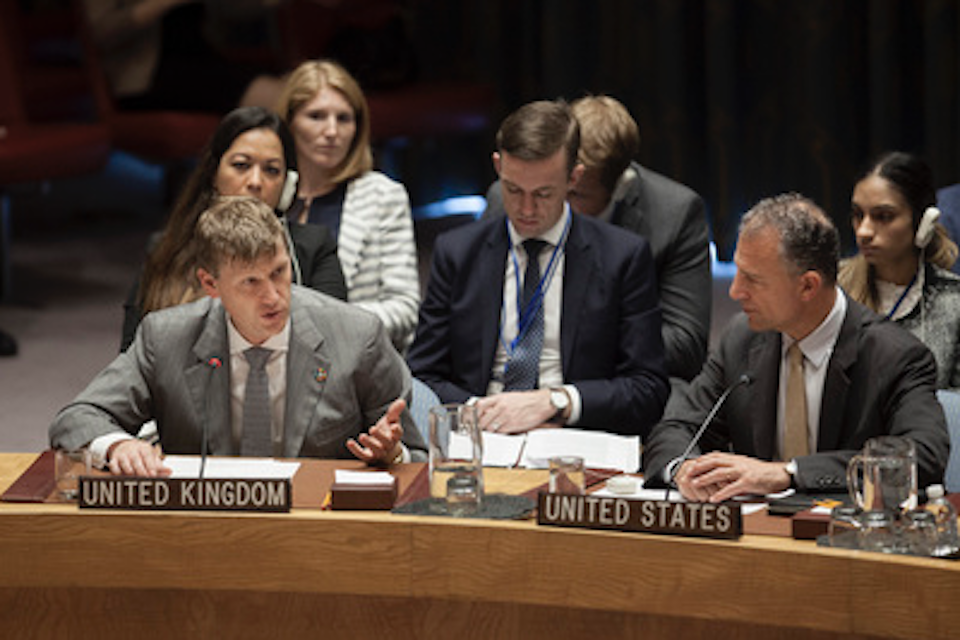Considering new and emerging threats to international peace
Statement by Ambassador Jonathan Allen at the Security Council Briefing on the maintenance of international peace and security.

Thank you Mr President and may I congratulate you on your Presidency and the US on theirs.
Let me start by thanking all of the committees for their work and for the Chairs for updating us on the implementation of these important resolutions. And in particular, I want to welcome the collaboration and joint working between the committees, as evidenced here today.
Firstly, let me address the work of Committees 1267 / 1989 / 2235 and 1373.
Mr President, no country is immune from the threat of terrorism, no region exempted from the threat which flows from the poisonous ideology which underpins it. Only through collaboration between countries within and between regions will we defeat the threat. We need a network of willing and capable countries to tackle the terrorist threat.
Now much is done bilaterally, the UN has a major role. Willingness to tackle the threat should of course be a matter of self-interest, but it also flows from binding Security Council resolutions and GA resolutions. And capability flows from the committees - from the Counter-Terrorism Committee, but also from C-TED, from UN-OCT, and for UN-CCT. And I welcome very much the joint working evidenced under the leadership of Under-Secretary-General Voronkov and Assistant Secretary-General Connix.
As identified in the Secretary-General’s report, the UK agrees that Da’esh has evolved from a territorial entity into a diffused and covert network which operates in a number of countries. Al-Qaida and its affiliates remain a persistent threat and challenge, and we are also facing threats to international peace and security from terrorist groups which have been inspired by Da’esh and Al-Qaida, in addition to others such as extreme right wing groups. Terrorist groups constantly change their methods and approaches, and we must be flexible and adaptable in our response.
As the Ambassador of Peru has said, it has been a feature of the threat in recent times to see the outflow of foreign terrorist fighters from many countries around this table. But as well as focussing on that, we must now focus on returnees to our countries, and re-locators to other theatres. We must not forget the foreign terrorist fighters currently in prison and others convicted of terrorism-related offenses, who may pose a threat both at home and abroad.
The UK wants to stress the important role that the private sector, academic researchers and civil societies can play in supporting Member States and UN bodies in countering terrorism and violent extremism. During the UK’s Presidency of the Security Council in August, we were pleased to invite a civil society briefer, Dr. Joana Cook, of the International Center for the Study of Radicalization in London, to share with the Council findings from their recent report on Da’esh women and minors, which enriched our understanding and discussion.
Mr President, I would like to stress that sanctions remain a key tool in combating terrorism. We welcome the continued engagement and cooperation of all Council members in our international efforts to combat this threat. And I welcome the appointment of Mr Daniel Kipfer Fasciati as Ombudsperson.
The UK welcomes the ongoing efforts of the Counter Terrorism Committee and Counter Terrorism Executive Directorate to address a broad spectrum of issues raised by recent resolutions - in particular, 2396. As others have said, a global Passenger Name Record standard is needed and we welcome the UN-OCT ICAL project to promote its responsible use and recognize the generous support of the government of the Netherlands.
Furthermore, we continue to encourage states to move towards the implementation of the Global Aviation Security Plan.
In line with Security Council Resolution 2395, it is important that CTED assessment and analytical tools are updated and made fit for purpose, and that these inform the capacity-building activities of the UN – including UN-OCT – and its partners.
We are pleased to invite CTED to conduct a visit to the United Kingdom in 2019 and look forward to working with the Committee to share good practices and technical assistance needs. And I encourage other states also to work with C-TED to facilitate similar visits to their own country. We can all learn.
Mr President, moving on to the 1540 Committee, I would like to acknowledge the Committee’s achievements, particularly with the completion of initial reports and engagement with Committee working groups. We support the Chair and the Committee’s focus on practical steps to support implementation of the resolution, such as voluntary National Action Plans. We welcome the example set by Chile and Colombia in conducting a peer review of Resolution 1540 implementation and suggest the Committee encourages other countries to do likewise.
We acknowledge that the Committee has played a crucial role to enable the meaningful exchange of information between States, improving the matchmaking processes to better meet assistance needs and build long-term capacity.
Now it is time for the Committee to become more active and strategically consider new and emerging threats. In particular, we encourage the Committee to consider responses to topical counter-proliferation issues affecting 1540/2325 implementation, such as emerging technologies and proliferation finance, and consider the role of international organisations and multilateral fora in raising awareness of these issues and we hope the Committee will meet more often going forward.
We encourage the ongoing work to raise awareness and profile of UNSCR 1540.
Mr President, the effective implementation of these resolutions is important to protect hard fought global norms and the rules based international system.
Let us step up our efforts.